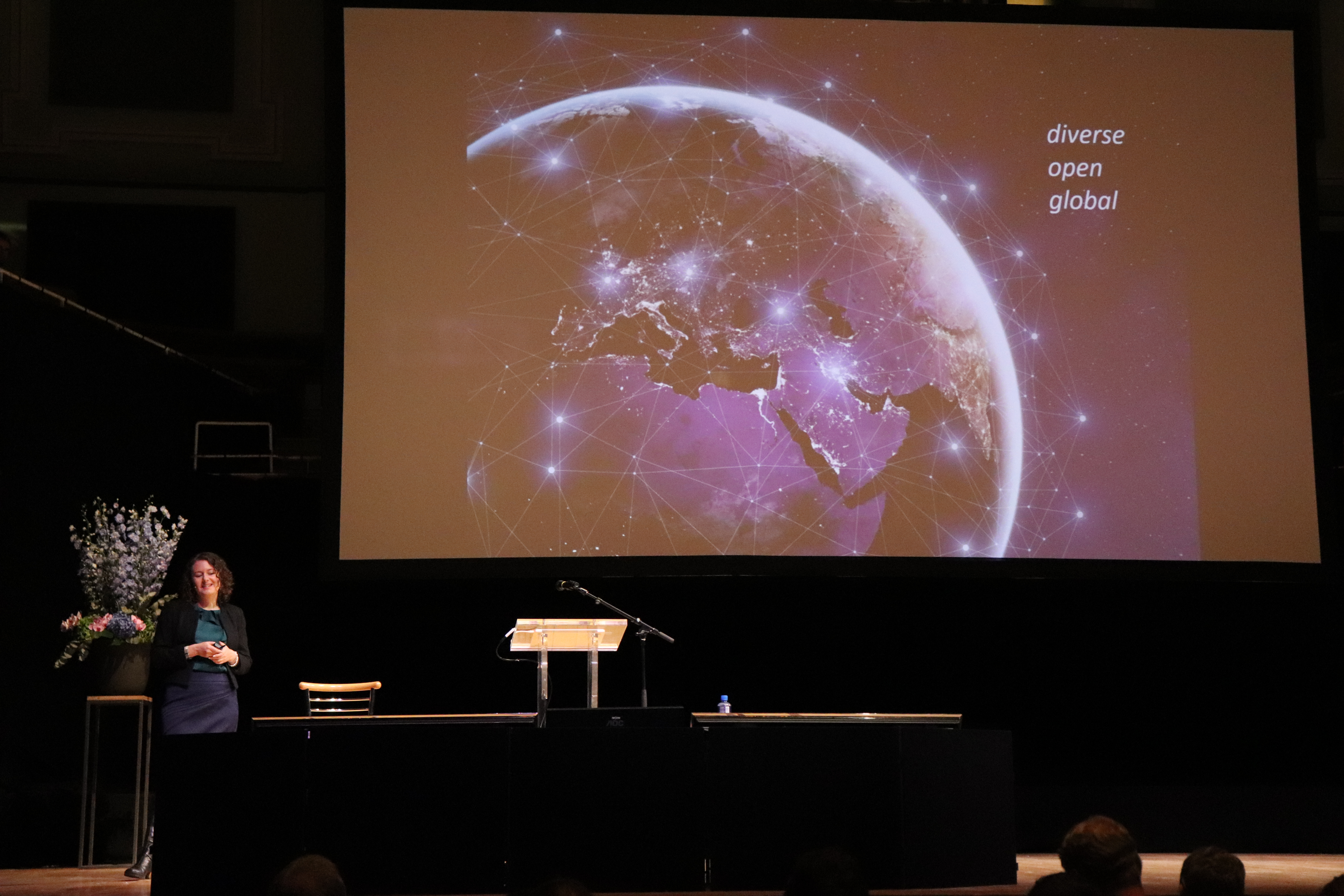“Sharing is caring” was the mantra mouthed by all mothers to their budding young scientists during childhood, however, it appears that this instilling of generosity during our youth has been forgotten by many of those who pursue academic careers.
Speaking at Schrödinger at 75 conference, Dr Kathryn Holt of the University of Melbourne concluded her talk with a plea to the academic attendees. She encouraged more cooperation, communication, and a rejection of egotism at the prospect of enhancing scientific discoveries. Backdropped by a screen declaring “diverse, open, global,” in bold, exaggerated text, Holt exuded passion as she implored the guests to support the Open Science movement. Holt’s work focuses on the global health crises of antimicrobial resistance. Collaboration in this field is of the utmost importance as specimen from patients are often diverse and must be collected and analysed promptly to elucidate a full picture of the evolution, progression, and transmission of bacterial pathogens. Without collaboration in this field, treatments for Ebola and Zika viruses would not have been developed.
Competition and secrecy within the scientific community may be stunting research, and this view has ignited intense debates into whether or not publications and data should be openly accessed. “Open Science” is the movement of making scientific data and dissemination accessible to all who wish to use it. Such democratisation of access could potentially increase humanity’s understanding of the world, increase the number of collaborations between scientists, and consequently speed up the occurrence of beneficial developments in fields of medicine, science, technology, and ultimately, all aspects of society. The Open Science movement has progressed rapidly in the past few years. Throughout the late 20th century, most research papers were only readily accessed by academics and universities who paid subscriptions to the journals. The advancements in global communication at the turn of the millennium initiated the movement for open access publishing. Websites such as “Sci-Hub” are perhaps, controversially, at the forefront of this progress. However, there is still a long way to go before the subscription based model is dismantled and scientific research becomes accessible to all. The European Commission, perhaps naively, hopes to achieve open access to all scientific publications by 2020. Currently, that goal looks unlikely.
“Competition and secrecy within the scientific community may be stunting research, and this view has ignited intense debates into whether or not publications and data should be openly accessed.”
The executive publisher of the journal Science, Alan Leshner, agrees that open access is “the right thing to do”, despite the magazine not adhering to this practice itself. “It would be great if we could afford open access to everything. The problem is it costs $50 million a year to publish one magazine, Science, alone.” This is why Open Science has not yet succeeded – money. Dr. Dan Bradley, a genetics professor at Trinity, echoes the sentiments of Leshner. Speaking to Trinity News, he says: “I am a supporter of freely available publications and data. It is the way things are going. However, it can be expensive.” Often, those who are forefronting the Open Access movement are not the ones who will suffer the repercussions of its dismantling. Prof. Bradley notes how it would push “the cost of publication onto the researcher rather than the reader, and publication fees can vary from €1,000 to €5,000 for some journals”.
“The fact is, if one gets to publish first, then one gets into better journals, and this can still influence the career of an early stage scientist. The drive to be first is possibly unavoidable.”
There is an assumption that cooperation should be pertinent in ensuring the rapidity of scientific advancements. However, the competitive nature of scientific groups contradicts this, and ensures that scientists prolong their allegiances to the subscription based model of publishing. Most academics are aware of the fact that certain journals hold prestige. There even exists a measure of how influential a journal is, known as the “impact factor” of a journal. For example, Nature’s impact factor was 42 in 2013, while the open access journal, Public Library of Science scored a measly 3.5 that same year. “The fact is, if one gets to publish first, then one gets into better journals, and this can still influence the career of an early stage scientist. The drive to be first, I think, is possibly unavoidable,” according to Prof Bradley. The inevitable drive of scientists to want their papers in certain journals will only prolong the process of achieving a diverse, global, and open scientific community.
“Such democratisation of access could potentially increase humanity’s understanding of the world”, increase the number of collaborations between scientists, and, consequently speed up the occurrence of beneficial developments in fields of medicine, science, technology, and ultimately, all aspects of society.”
Science has never truly been an “open” institution that can be accessed by all members of society. Third level education is often necessary to fully grasp the details of certain ideas, creating a class divide in the field between those who can afford such education and those who are less fortunate. The scientific community can be somewhat elitist towards those ignorant to their concepts and ideas. This is perhaps the reason why the democratisation of science and free access to publications is slow to follow suit in the liberalist movements that have manifested in other sectors of society, including entertainment, politics, and art. The community can “afford” to be closed off as science is intrinsically inaccessible to those who don’t understand it. By allowing the public free access to scientific discoveries, it removes the opportunity for publishing companies and individuals to gain from the profitability that can be achieved from publishing their research. People innately want a financial gain for their hard work, and so it may be a long time before Holt’s dream of a “diverse, open, global” scientific community can be realised.






